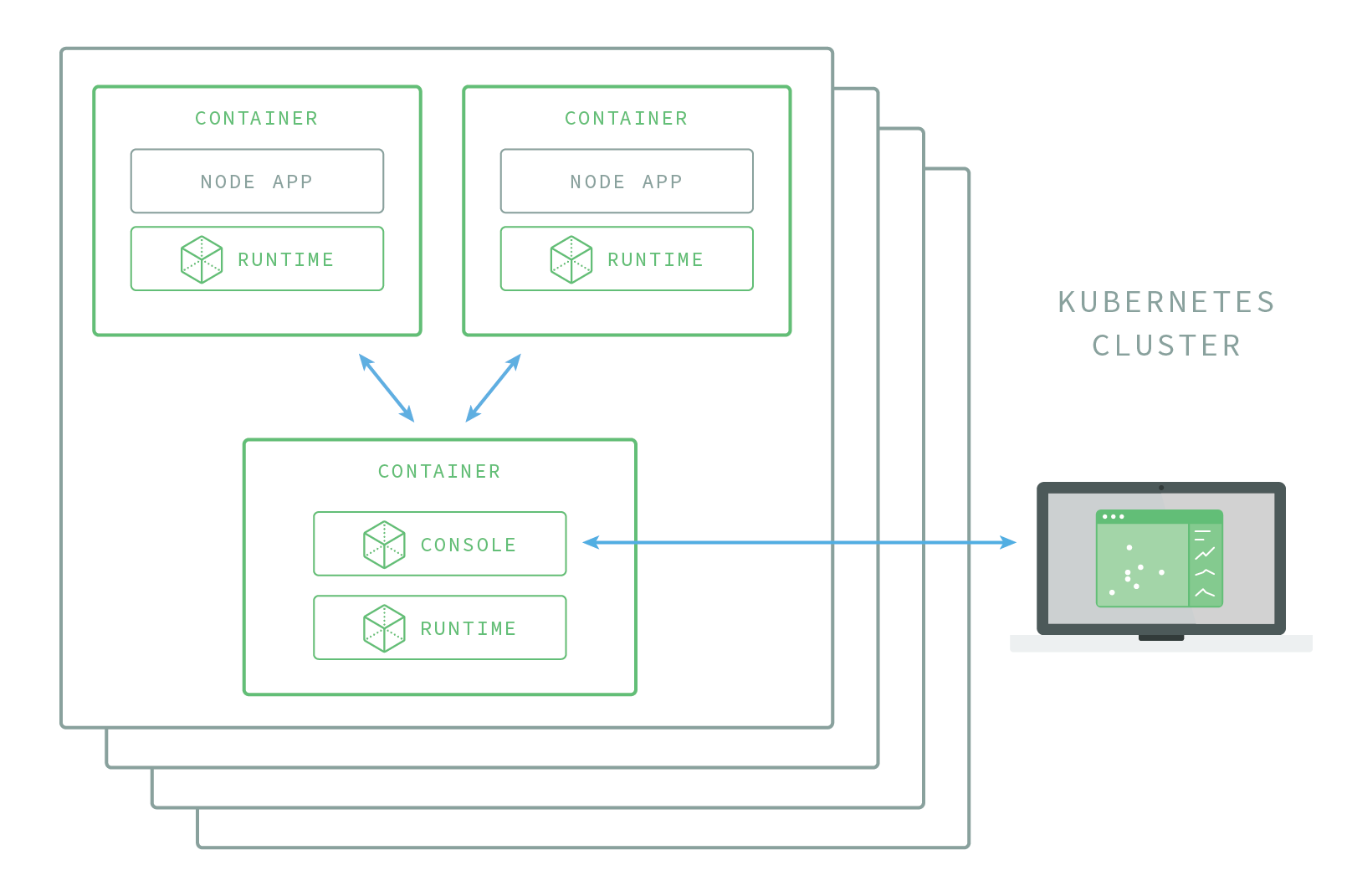This repository is for deploying N|Solid with Kubernetes. It assumes that Kubernetes is already setup for your environment.
- Installing kubernetes
- Quickstart
- Deploy Sample App with N|Solid
- Production Install
- Debugging / Troubleshooting
- License & Copyright
- local with minikube - for local development / testing.
- kubernetes on GKE - Google Container Enginer
- kubernetes on aws - Amazon Web Services
- kubernetes on GCE - Google Compute Engine
- kubernetes on Azure - Microsoft Azure (Weave-based)
- kubernetes on Azure - Microsoft Azure (Flannel-based)
Make sure your kubectl is pointing to your active cluster.
./installThis command will install the N|Solid Console, Hub, and a secure HTTPS proxy to the nsolid namespace.
It can take a little while for Kubernetes to download the N|Solid Docker images. You can verify that they are active by running:
kubectl --namespace=nsolid get pods
When all four pods (console, hub, nginx-secure-proxy, and registry) have a status of 'Running', you may continue to access the N|Solid Dashboard.
### Access N|Solid Dashboard- Default username:
nsolid - Default password:
demo
printf "\nhttps://$(minikube ip):$(kubectl get svc nginx-secure-proxy --namespace=nsolid --output='jsonpath={.spec.ports[1].nodePort}')\n"or
kubectl get svc nginx-secure-proxy --namespace=nsolidOpen EXTERNAL-IP
NOTE: You will need to ignore the security warning on the self signed certificate to proceed.
N|Solid is free for non-production use, but does require a license key. Request one from the Console welcome screen. For more information, see the N|Solid Quickstart.
### Uninstall N|Solid from kubernetes clusterkubectl delete ns nsolid --cascadecd sample-app
docker build -t sample-app:v1 .
kubectl create -f sample-app.service.yml
kubectl create -f sample-app.deployment.ymlNOTE: container image in sample-app.deployment.yml assumes sample-app:v1 docker image. This will work if your using minikube and ran eval $(minikube docker-env).
If you are working in a cloud environment, you will need to push the sample-app to a public Docker registry like Dockerhub or Quay.io, and update the sample-app Deployment file.
## Production InstallNOTE: Assumes kubectl is configured and pointed at your kubernetes cluster properly.
#### Create the namespace `nsolid` to help isolate and manage the N|Solid components.kubectl create -f conf/nsolid.namespace.yml
openssl req -x509 -nodes -newkey rsa:2048 -keyout conf/certs/nsolid-nginx.key -out conf/certs/nsolid-nginx.crt
rm ./conf/nginx/htpasswd
htpasswd -cb ./conf/nginx/htpasswd {username} {password}
kubectl create secret generic nginx-tls --from-file=conf/certs --namespace=nsolid
kubectl create -f conf/nsolid.services.ymlN|Solid components require persistent storage. Kubernetes does not (yet!) automatically handle provisioning of disks consistently across all cloud providers. As such, you will need to manually create the persistent volumes.
##### On Google CloudMake sure the zone matches the zone you brought up your cluster in!
gcloud compute disks create --size 10GB nsolid-registry
gcloud compute disks create --size 10GB nsolid-console
We need to create our disks and then update the volumeIds in conf/nsolid.persistent.aws.yml.
Make sure the zone matches the zone you brought up your cluster in!
aws ec2 create-volume --availability-zone eu-west-1a --size 10 --volume-type gp2
aws ec2 create-volume --availability-zone eu-west-1a --size 10 --volume-type gp2
kubectl create -f conf/nsolid.persistent.gce.ymlkubectl create -f conf/nsolid.persistent.aws.ymlkubectl create -f conf/nsolid.cloud.ymlMake sure your docker image is build on top of nodesource/nsolid:v1.4.0.
FROM nodesource/nsolid:v1.4.0When defining your application make sure the following ENV are set.
env:
- name: NSOLID_APPNAME
value: sample-app
- name: NSOLID_HUB
value: "registry.nsolid:80"
- name: NSOLID_SOCKET
value: "8000"NOTE: NSOLID_SOCKET needs to be set so it isn't automatically assigned. It also needs to be exposed via the ports pod options so the N|Solid hub can communicate.
Optional flags:
env:
- name: NSOLID_TAGS
value: "nsolid-v1.4.0,staging"A comma seperate list of tags that can be used to filter processes in the N|Solid console.
#### Accessing your Appkubectl get svc {service-name}The EXTERNAL-IP will access the application.
Make sure you use the --namespace=nsolid flag on all kubectl commands.
kubectl config current-context // outputs current context
kubectl config set-context {$context} --namespace=nsolid // make 'nsolid` the default namespace
kubectl config set-context {$context} --namespace=default // revert to defaultVerify CLI:
kubectl exec {pod-name} -- nsolid-cli --hub=hub:80 pingSee N|Solid cli docs for more info.
### minikubeMinikube is a bit different then a normal kubernetes install. The DNS service isn't running so discovering is a bit more involved. IP addresses are not dynamically assigned, instead we must use the host ports the service is mapped to.
#### Setting ENV for clusterIf your doing a lot of work with docker and minikube it is recommended that you run the following:
eval $(minikube docker-env)Get the kubernetes cluster ip address:
minikube ipTo get the service port:
kubectl get svc {$service-name} --output='jsonpath={.spec.ports[0].nodePort}'Note: If your service exposes multiple ports you may want to examine with --output='json' instead.
If you get the following message when trying to run docker build or communicating with the kubernetes api.
Error response from daemon: client is newer than server (client API version: 1.24, server API version: 1.23)Export the DOCKER_API_VERSION to match the server API version.
export DOCKER_API_VERSION=1.23nsolid-kubernetes is Copyright (c) 2016 NodeSource and licensed under the MIT license. All rights not explicitly granted in the MIT license are reserved. See the included LICENSE.md file for more details.


